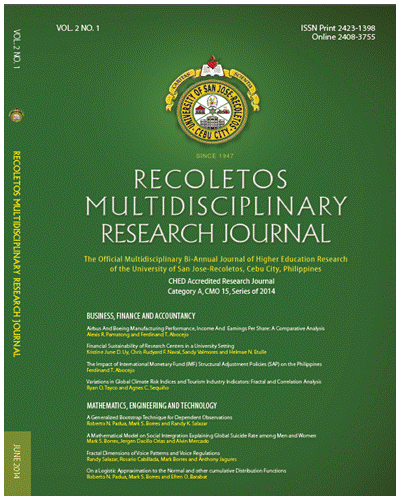Airbus and Boeing Manufacturing Performance, Income and Earnings Per Share: A Comparative Analysis
DOI:
https://doi.org/10.32871/rmrj1402.01.01Keywords:
Earnings per share, Net income, manufacturing performance, airbus, boeing, InvestmentAbstract
This study examined the worth of investing in Airbus and Boeing to determine which company yields better investment prospect in the future. In order to do so, the study compares Airbus and Boeing in terms of net income, earnings per share, and performance in terms of order intake and delivery. The study was limited to only the two major aircraft manufacturers which are Airbus and Boeing. Also, the study uses secondary data from 1999- 2013 from both Airbus and Boeing. All of the computations were derived using Minitab and MS excel. The study found that there is a significant difference between Boeing and Airbus’s net income stability with Boeing being more stable than Airbus. Also, their earnings per share, when compared, found that Boeing provided their investors with larger earnings. Lastly, when the performance of both companies was compared, there was a significant difference between Boeing and Airbus’s level of efficiency and it resulted in Boeing being more efficient. The findings indicate that Boeing is a wiser investment compared to Airbus. There has been a lot of arguments and literature comparing both Airbus and Boeing but none provides investors with information as to which company to choose. Because of the lack of research on this specific issue, this study aims to provide further information on Airbus and Boeing to investors.
References
Airbus. (2002). 2002 Annual Report. Retrieved from http://www.airbus-group.com/dms/airbusgroup/int/en/investor-relations/documents/2002/annual_report02_annual_review_en.pdf
Airbus. (2003). 2003 Annual Report. Retrieved from http://www.airbus-group.com/dms/airbusgroup/int/en/investor-relations/documents/2003/financial-statements-2003/Full_year_earnings_2003_en.pdf
Airbus. (2004). 2004 Annual Report. Retrieved from http://www.airbus-group. com/dms/airbusgroup/int/en/investor-relations/documents/2004/presentations/result_pre_h1_2004_en.pdf.
Airbus. (2010). 2010 Annual Report. Retrieved from http://www.airbus-group.com/dms/airbusgroup/int/en/investor-relations/documents/2011/Events-Reports/AR_RegDoc_2010/2may_EADS_AR_ok/EADS%20Annual% 20 Review%202010.%20Flight%20into%20the%20Future.pdf.
Airbus. (2010). 2010 Annual Report. Retrieved from http://www.airbus-group.com/dms/airbusgroup/int/en/investor-relations/documents/2008/Financial-Statements-2008/Full_year_earnings_2008_en.pdf
Boeing. (2003). 2003 Annual Report. Retrieved from http://www.boeing.com/assets/pdf/companyoffices/financial/finreports/
annual/03annual report/ boeing_03ar.pdf
Boeing. (2004). 2004 Annual Report. Retrieved from http://www.boeing.com/assets/pdf/companyoffices/financial/finreports/
annual/04annualreport/ BOEING_04AR.pdf
Boeing. (2005). 2005 Annual Report. Retrieved from http://www.boeing.com/assets/pdf/companyoffices/financial/finreports/
annual/05annual report/ 05AR_links.pdf
Boeing. (2008). 2008 Annual Report. Retrieved from http://www.boeing.com/assets/pdf/news/releases/2008/q1/080130a_nr.pdf
Boeing. (2009). 2009 Annual Report. Retrieved from http://www.boeing.com/assets/pdf/companyoffices/financial/finreports/
annual/2009/annual_re port. pdf
Boeing. (2010). 2010 Annual Report. Retrieved from http://www.boeing.com/assets/pdf/companyoffices/financial/finreports/
annual/2010/annual_repor t.pdf
Boyd, T., & Cortese-Danile, T. (2001). A better understanding of earnings per share. Commercial Lending Review, 16(2):58-62. Retrieved fromhttp://search. proquest.com/docview/229675054?accountid=50192
Donnelly, S. B. (2005). Cliff hangar with new planes and a little help from their friendly national governments. Time International. 166:36.
Retrieved from http://search. proquest.com/docview/214287913?accountid=50192
Francis, J. G., & Pevzner, A. F. (2007). Airbus and Boeing:Strengths and limitations of strong states. PoliticalScience Quarterly, 121(4), 629-651. Retrieved from http://search. proquest.com/docview/20827795
4?accountid=50192
Goll, I., & Rasheed, A. A. (2011). The effects of 9/11/2001 on business strategy variability in the US air carrier industry. Management Decision, 49(6):948-961. doi:http://dx. doi.org/10.1108/00251741111143621
Leachman, C., Pegels, C. C., & Shin, S. K. (2005). Manufacturing performance: Evaluation and determinants. International Journal of Operations & Production Management, 25(9), 851-874.
Retrieved from http://search. proquest.com/docview/2323 633 74? accountid=50192
Oliver, R. (1974). Expectancy Theory Predictions of Salesmen’s Performance. Journal of Marketing Research 11:243-253.
Ozyasar, H. (2013). The Advantages of Net Income in a Business. Retrieved from http://smallbusiness.chron.com/advantages-net-incomebusiness-25241. html
Tong, C. H., & Lee-Ing, T. (2003). Boeing VS. Airbus:Competing for the future. Competitiveness Review, 13(2):28-33. Retrieved from http://
search.proquest. com/docview/213072478?accountid=50192
Weiss, S.I. (2013). Boeing company. Retrieved from http://www.britannica.com/EBchecked/topic/71254/Boeing-Company/225622/History-of-Boeing-Company
Downloads
Published
How to Cite
Issue
Section
License
Copyright of the Journal belongs to the University of San Jose-Recoletos


